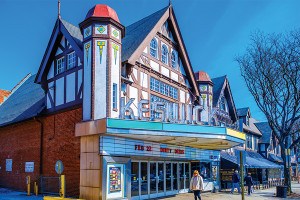Is Philadelphia’s Next Casino Just a Spoonful of Slots to Make the Restaurants Go Down?

A rendering of Bart Blatstein’s Provence casino.
One of the things that struck us about Bart Blatstein’s Provence casino proposal from the day it was announced was the function the casino would perform. Of course, it’s the largest single element of the project, but both from its placement (above the street-level restaurants and shops) and the facilities attached to it (a concert venue and rooftop shopping village), it almost seemed the casino was an appendage needed to make all the other goodies possible.
Since that grand announcement party almost a year ago, the other projects vying for the city’s second casino license have largely evolved in the Provence’s direction. Market8, the closest in concept at the start, enlarged its hotel and added more street-level variety. Casino Revolution tacked on a theme park of sorts. And so on.
Blatstein’s introduction of two star chefs for the Provence more or less confirmed our view of the project. It’s not that casinos lose money; if they did that, there wouldn’t be five bidders competing for one casino license. Rather, it’s that the casino is no longer the biggest moneymaker in such projects.
“Revenue from restaurants and shops began to outpace income from casinos in Las Vegas about 10 years ago,” said Philip M. Colicchio, principal of a Princeton law firm that works with restaurant and entertainment clients and cousin of Tom Colicchio, one of those two star chefs.
Figures from the American Gaming Association, the gaming industry trade group, show that gross gaming revenues – what casinos keep after returning winnings to customers, the industry equivalent of sales income – returned to pre-Great Recession levels in 2012, but the annual growth has been modest.
Colicchio noted that most of the newer casinos in Vegas emphasize entertainment as much as the thrill of the game. This, he says, doesn’t surprise him, as casinos need to attract customers like him who have little interest in gambling (“I don’t have the touch,” he said).
Fine restaurants, concerts, shops and recreational activities appeal to a broader base of customers. Some of them may even drop a little coin in the casino before or after their meal or shopping trip.
The other thing Colicchio said was certain to happen as a result of a second Philly casino: Atlantic City would take it on the chin again. “Whatever happens, it will be bad news for Atlantic City,” he said. “These guys” – Colicchio and Andrew Carmellini – “were approached about opening places there, and they passed on the opportunity.”


